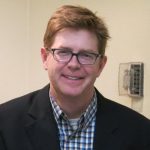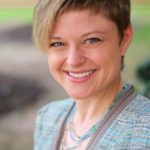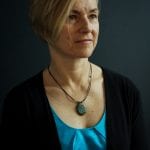Allison M. Macfarlane is Professor of Science and Technology Policy at George Washington University and Director of the Institute for International Science and Technology Policy at the University’s Elliott School of International Affairs. She recently served as Chairman of the U.S. Nuclear Regulatory Commission from July, 2012 until December, 2014. As Chairman, Dr. Macfarlane had ultimate responsibility for the safety of all U.S. commercial nuclear reactors, for the regulation of medical radiation and nuclear waste in the U.S., and for representing the U.S. in negotiations with international nuclear regulators. She was nominated by President Obama and confirmed by the Senate. She was the agency’s 15th Chairman, its 3rd woman chair, and the only person with a background in geology to serve on the Commission.
Dr. Macfarlane holds a doctorate in geology from the Massachusetts Institute of Technology and a bachelor’s of science degree in geology from the University of Rochester. During her academic career, she held fellowships at Radcliffe College, MIT, Stanford, and Harvard Universities. She has been on the faculty at Georgia Tech in Earth Science and International Affairs and at George Mason University in Environmental Science and Policy.
From 2010 to 2012 she served on the Blue Ribbon Commission on America’s Nuclear Future, created by the Obama Administration to make recommendations about a national strategy for dealing with the nation’s high-level nuclear waste. She has served on National Academy of Sciences panels on nuclear energy and nuclear weapons issues. Dr. Macfarlane has also chaired the Science and Security Board of the Bulletin of Atomic Scientists, the folks who set the “doomsday clock.”
Her research has focused on environmental policy and international security issues associated with nuclear energy. Her expertise is in nuclear waste disposal, nuclear energy, regulatory issues, and science and technology policy. As Chairman of the Nuclear Regulatory Commission, she pushed for a more open dialogue with the public, for greater engagement with international nuclear regulators and, following the Fukushima accident, for stricter safety protocols at U.S. nuclear reactors. She also advocated for a more family-friendly workplace. She has spoken on a wide range of topics, from women and science to nuclear policy and regulatory politics.
In 2006, MIT Press published a book she co-edited, Uncertainty Underground: Yucca Mountain and the Nation’s High-Level Nuclear Waste, which explored technical issues at the proposed waste disposal facility at Yucca Mountain, Nevada. Dr. Macfarlane has published extensively in academia and her work has appeared in Science, Nature, American Scientist, The Bulletin of Atomic Scientists, and Environment Magazine.
Education
Ph.D., Massachusetts Institute of Technology
Publications
Christopher Cahill is an expert in solid-state and materials chemistry with a particular emphasis on X-ray crystallography. He has published over 120 peer reviewed papers in a range of areas related to the synthesis and structural characterization of materials and minerals. Current research areas include exploring the behavior of uranium species under environmentally relevant  conditions as well as the synthesis of lanthanide containing sensor materials. More recent efforts include nuclear science curriculum development for non-technical individuals within the energy and weapons proliferation arenas.
conditions as well as the synthesis of lanthanide containing sensor materials. More recent efforts include nuclear science curriculum development for non-technical individuals within the energy and weapons proliferation arenas.
He joined the faculty of GWU in 2000 after a one-year post-doctoral position in the Environmental Mineralogy group at the University of Notre Dame. He is a recipient of the prestigious NSF CAREER Award (2004), a Bender Teaching Award (2005), a Fulbright Scholarship (2008) and the Oscar and Shoshanna Trachtenberg Prize for Excellence in Teaching (2013). He is a past member of the US National Committee for Crystallography, a Past President of the American Crystallographic Association and has held visiting researcher positions at the Carnegie Institution of Washington and Argonne National Laboratory. Most recently, he served as the American Institute of Physics State Department Science Fellow in the Bureau of International Security and Nonproliferation’s Office of Weapons of Mass Destruction-Terrorism on the Nuclear Forensics Team.
Education
Ph.D, State University of New York- Stony Brook
Areas of Expertise
Solid-state and materials chemistry of the f-elements, crystallography, nuclear fuel cycle, science and technology policy, scientific communication/public engagement, curriculum development, nuclear forensics.
 Emily Hammond is a nationally recognized expert in energy law, environmental law, and administrative law. A former environmental engineer, she brings technical fluency to cutting-edge issues at the intersection of law, science, and policy. Professor Hammond’s scholarship focuses on regulatory process, the responses of various legal institutions to scientific uncertainty, electricity markets, climate change, and the law of water quality. Her articles have appeared in numerous top-ranked journals, including the Columbia Law Review, the Duke Law Journal, the Michigan Law Review, and the Vanderbilt Law Review. She is a co-author of one of the nation’s leading energy law texts, Energy, Economics and the Environment, and the environmental law text Environmental Protection: Law and Policy, in addition to a variety of book chapters and shorter works.
Emily Hammond is a nationally recognized expert in energy law, environmental law, and administrative law. A former environmental engineer, she brings technical fluency to cutting-edge issues at the intersection of law, science, and policy. Professor Hammond’s scholarship focuses on regulatory process, the responses of various legal institutions to scientific uncertainty, electricity markets, climate change, and the law of water quality. Her articles have appeared in numerous top-ranked journals, including the Columbia Law Review, the Duke Law Journal, the Michigan Law Review, and the Vanderbilt Law Review. She is a co-author of one of the nation’s leading energy law texts, Energy, Economics and the Environment, and the environmental law text Environmental Protection: Law and Policy, in addition to a variety of book chapters and shorter works.
An elected member of the American Law Institute, Professor Hammond is also past chair of the American Association of Law Schools’ Administrative Law Section and a member scholar of the Center for Progressive Reform. She has consulted on various energy, environmental, and administrative law matters, authored amicus briefs, and testified before Congress on these issues. Professor Hammond actively collaborates with other researchers from a variety of disciplines within her field, and she is a past Distinguished Young Environmental Scholar recipient at the Stegner Center, University of Utah.
Prior to joining the GW law faculty, Professor Hammond served on the faculties at Wake Forest University and the University of Oklahoma College of Law, where she served as Associate Dean for Academic Affairs and Associate Director of the Law Center, and won numerous teaching awards. She has visited at the University of Texas, Florida State University, and the University of Georgia. Before entering academia, Professor Hammond practiced with law with Bondurant, Mixson & Elmore, LLP in Atlanta, Georgia, and clerked for Judge Richard W. Story of the U.S. District Court for the Northern District of Georgia.
Education
BS, Virginia Polytechnic Institute & State University; JD, University of Georgia
Publications
Publication
 Philippe Bardet is an Associate Professor at the George Washington University (GW). He holds a primary appointment in Mechanical and Aerospace Engineering Department with a courtesy appointment in the Elliott School of International Affairs. After his doctoral studies, Dr. Bardet was a lecturer and postdoctoral fellow at UC Berkeley, before postdoctoral training at the California Institute of Technology. He joined the Faculty at GW in August 2010. His current research aims at uncovering complex physical phenomena through the development and deployment of laser diagnostics and experimental facilities. His multiphase flow research is focused on free surface turbulence, interface shear at liquid-gas interface, and mass transfer. He is also active in Fluid-Structure Interactions in nuclear and maritime environments, stratified flows, and accident scenarios of the Very High-Temperature Gas cooled Reactor. His research group is currently developing non-intrusive laser based velocimetry techniques, both particle based and seedless as well as spectroscopic techniques to measure water vapor temperature and pressure and dissolved gas concentration in liquids. Dr. Bardet teaches courses in Fluid Mechanics, Thermodynamics, Experimental Methods, and Optics.
Philippe Bardet is an Associate Professor at the George Washington University (GW). He holds a primary appointment in Mechanical and Aerospace Engineering Department with a courtesy appointment in the Elliott School of International Affairs. After his doctoral studies, Dr. Bardet was a lecturer and postdoctoral fellow at UC Berkeley, before postdoctoral training at the California Institute of Technology. He joined the Faculty at GW in August 2010. His current research aims at uncovering complex physical phenomena through the development and deployment of laser diagnostics and experimental facilities. His multiphase flow research is focused on free surface turbulence, interface shear at liquid-gas interface, and mass transfer. He is also active in Fluid-Structure Interactions in nuclear and maritime environments, stratified flows, and accident scenarios of the Very High-Temperature Gas cooled Reactor. His research group is currently developing non-intrusive laser based velocimetry techniques, both particle based and seedless as well as spectroscopic techniques to measure water vapor temperature and pressure and dissolved gas concentration in liquids. Dr. Bardet teaches courses in Fluid Mechanics, Thermodynamics, Experimental Methods, and Optics.
Education
Ph.D, UC Berkeley
 Sharon Squassoni is an expert on nuclear weapons proliferation and measures to reduce nuclear risks. Her current research focuses on proliferation risks from nuclear fuel cycle capabilities and measures to enhance transparency related to nuclear weapons and fissile material. She directed the Proliferation Prevention Program at the Center for Strategic and International Studies from 2010 to 2017 and was a senior scholar at the Carnegie Endowment for International Peace from 2007 to 2010.
Sharon Squassoni is an expert on nuclear weapons proliferation and measures to reduce nuclear risks. Her current research focuses on proliferation risks from nuclear fuel cycle capabilities and measures to enhance transparency related to nuclear weapons and fissile material. She directed the Proliferation Prevention Program at the Center for Strategic and International Studies from 2010 to 2017 and was a senior scholar at the Carnegie Endowment for International Peace from 2007 to 2010.
Ms. Squassoni advised Congress from 2002 to 2007 as a senior specialist in weapons of mass destruction at the Congressional Research Service (CRS) and held other staff positions at the Department of State and in the Arms Control and Disarmament Agency from 1992 to 2001. She is the recipient of various service awards, has published widely, and is a frequent commentator for U.S. and international media outlets. Ms. Squassoni received her B.A. in political science from the State University of New York at Albany, a master’s in public management from the University of Maryland, and a master’s in national security strategy from the National War College.
Ms. Squassoni is a member of the International Institute for Strategic Studies, a member of the Science & Security Board of the Bulletin of Atomic Scientists, and a member of the advisory board of the PIR Center in Moscow.
Education
MPM, University of Maryland, MNSS, National War Colle
Staff
Samantha D’Introno is the Nuclear Policy Research Program Assistant at the Institute for International Science and Technology Policy at the George Washington University. Samantha previously worked at trade associations specializing in energy and financial services. Samantha earned a dual Bachelor’s Degree in History and International Politics specializing in European Affairs and International Security from George Mason University. She earned a Master’s Degree at the George Washington University’s Graduate School of Political Management, where she studied political management and global public relations. She wrote her capstone paper on the “Political/PR Implications of Brexit within Euratom.”
